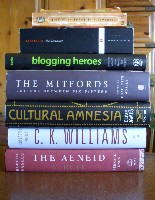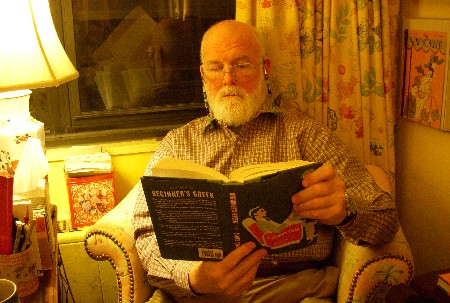
A few weeks ago, Kathleen flew down to West Palm for a conference. On the flight, she overheard a lady in the row behind her tell another passenger about her visit to New York. She had come up from Palm Beach, where she lived, to hear her son give a book reading. His new novel, which she said was “light” and “fun,” was called, as best Kathleen could make out, Beginner’s Grief, or maybe Beginner’s Brief.
When the plane landed, Kathleen had a chance to take a look at the lady, whose voice had sounded not unfamiliar. Indeed, it was Mrs Collins, the mother of one of Kathleen’s schoolmates from the Convent of the Sacred Heart, Carol Collins. Ordinarily, I would not be telling you any of these details, but as you can already guess — because you’ve seen the generous ads in Condé Nast publications and perhaps even read the brief review in The New Yorker, the novel that Mrs Collins had flown to New York to hear read by her son was James Collins’s Beginniner’s Greek.
I’m not sure that I’d have ordered a copy of Beginner’s Greek if it hadn’t been for this extenuated connection — I have no business indulging in “light” and “fun” books at the moment, especially with the holidays just over — but I must say that I’m enjoying it very much, and not as a guilty pleasure, either. The writing is very good: I want to interrupt Kathleen by reading almost every paragraph aloud.
Why was Peter marrying Charlotte? Why was Charlotte marrying Peter? Charlotte worked in the New York office of L’Alliance Générale et Spécifique des Pays Francophones. The AGSPF fostered economic and cultural exchange among the French-speaking peoples of the world and tried to promote the French language and Francophone civilization in all places sadly suffering from their lack. Dogged and intelligent, Charlotte had mastered the politics of Chad (Djamous, the finance minister, was on the rise, though not supported by the Quay d’Orsay) and the diplomacy of Laos. She was, it seemed, always writing a report on intra-Francophone trade. There were lot of tables. In addition to this intellectual work, Charlotte also participated in the AGSPF’s busy social life: no minor Algerian poet could pass through New York without a reception. That’s what was happening tonight. Charlotte had to attend a dinner for a Belgian economist, who had appeared in town unexpectedly.
For a time, Charlotte’s father had worked in the Paris office of a New York law firm and the family had moved there when Charlotte was seven. With this credential, she could legitimately make France her thing, which she proceeded to do. After her parents divorced, when she was sixteen, Charlotte’s father and her stepmother bought a small property in the countryside, where they went every summer and where Charlotte would visit. Charlotte majored in French and she spent two years in Paris after college.
There she had had the requisite love affair with a Frenchman, with lots of tears. Maximilien-François-Marie-Isidore had been thirty-seven, an incredibly ancient and sophisticated age for Charlotte, then twenty-two. He was always lurking in the background, supposedly poised to swoop in and carry Charlotte back to Paris forever. That never seemed to happen, but on a regular basis, heavy-smoking, black-whiskered French friends — Héli, Valéry, Claude, Hilaire-Germain, Alexandre-César-Léopold, Gilles — would pass through New York. They would take Charlotte and Peter to obscure rock clubs and talk endlessly about American bands and films and writers whom Peter had never heard of. Of course, they all spoke English perfectly, and from time to time one or the other would engage Peter in conversation, while making it evident that he was merely doing so out of politeness.
Without wishing to be in any way reductive, I’ll nevertheless venture that Beginner’s Greek is the acerbically romping Knickerbocker comedy that Louis Auchincloss has declined to give us.
As Kathleen and Mrs Collins were parting, after their effusive greetings at the airport, the author’s mother — who hadn’t seen Kathleen in decades — asked Kathleen to be sure to “give my best to Kathy!” Oh, well.






 It will take a while, I expect, for a clear narrative to explain Jérôme Kerviel’s disastrous trades at SocGen. All we know now is that nobody can figure out how the young man contrived to hide his balloon of unauthorized bets. Well, we do know one other thing. It is mentioned in almost every news story, even though it has nothing to do with the wrongdoing. Mr Kerviel did not attend one of the Grandes Écoles — those redoubtable institutions that the
It will take a while, I expect, for a clear narrative to explain Jérôme Kerviel’s disastrous trades at SocGen. All we know now is that nobody can figure out how the young man contrived to hide his balloon of unauthorized bets. Well, we do know one other thing. It is mentioned in almost every news story, even though it has nothing to do with the wrongdoing. Mr Kerviel did not attend one of the Grandes Écoles — those redoubtable institutions that the 







